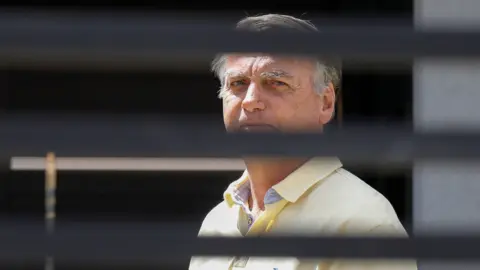Jair Bolsonaro: The Political Journey from Outsider to Convicted President

 Getty Images
Getty ImagesIn September 2018, as Jair Bolsonaro campaigned in the south-eastern city of Juiz de Fora, a 40-year-old man pushed through the crowd and stabbed the presidential candidate in the stomach.
Images of Bolsonaro doubled over in pain, wearing a T-shirt in Brazil's football colours, were shared millions of times and broadcast endlessly on television.
The former army captain survived, and the shock and commotion caused by the attack boosted his outsider image and helped carry him to victory weeks later.
Seven years on, Brazil's Supreme Court has found him guilty of plotting a coup and sentenced him to more than 27 years in prison. On the face of it, Bolsonaro's career is over.
However, he remains one of the most consequential politicians of recent decades, and with allies already pushing for amnesty, his influence and even the prospect of a comeback still hangs over Brazil's future.
Because of his inflammatory rhetoric, Bolsonaro was never taken seriously by most of Brazil's political establishment before becoming president.
In July 2018, three months before the election, I was BBC Brasil's São Paulo bureau chief. In conversations with pollsters, politicians and business leaders, the consensus was clear: despite leading in most polls, Bolsonaro could not win; he lacked the machinery of a major party and his support would quickly fade once television campaigning began.
In October 2018, that coalition turned out in force to vote him into power. His presidency looked nothing like any Brazilian government since the country's return to democracy in the 1980s.
Bolsonaro managed to turn the Brazilian right into a mass movement for the first time in history. Yet translating that into a government was another story.
His administration was pro-business, and aligned itself diplomatically with Donald Trump's United States - who Bolsonaro hailed as an inspiration.
In the aftermath of the election, Bolsonaro remained silent and out of public view. When he finally spoke, it was only briefly. He did not acknowledge defeat - something that he would never do - but authorised the start of the transition.
At the same time, instigated by the president, his supporters were using lorries to block roads across Brazil, while hundreds of Bolsonaro loyalists camped outside army barracks demanding that the election be annulled and the armed forces intervene to prevent Lula's inauguration.
In April of 2025, the Supreme Court scheduled his trial.
The former president was eventually convicted by the Supreme Court on all five charges of which he had been accused, including plotting a coup and leading an armed conspiracy. He is now barred from running for any public office until 2060.


















